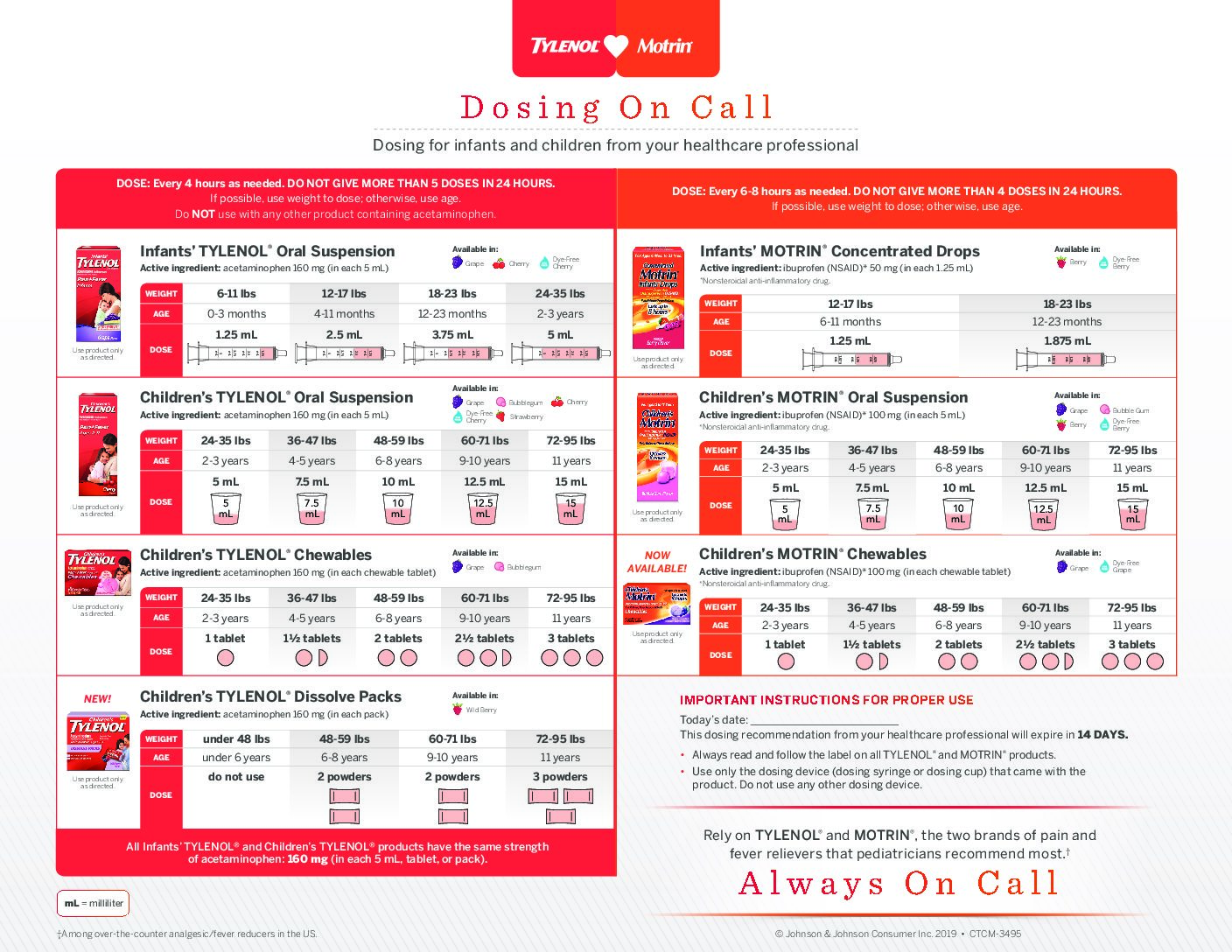
Parent Resources
Parent Resources

Medication Dosage Charts
Acetaminophen and Ibuprofen
Use this table to help correctly dose your child’s Tylenol/Ibuprofen.
Do not give Tylenol® to children under 3 months of age without first consulting your doctor.
Do not use ibuprofen (also known as Motrin® and Advil®) before the age of 6 months.
Ibuprofen (also known as Motrin® and Advil®) is a medicine used to reduce fever and pain. It is an “over-the-counter” medicine, meaning that you can get it without a doctor’s prescription.
This table* can help you figure out the right amount to give. Use your child’s weight to decide on the right amount to give. Be sure to check with your child’s primary care doctor to make sure you are give the right amount.

Source: adapted from tylenolprofessional.com
Diphenhydramine Dosing Table
Diphenhydramine (also known as Benadryl®) is a medicine used to treat allergic reactions, hives, and allergies that affect the nose.
- Do not give diphenhydramine to children less than 6 years of age.
- The measuring dose should be in “mL” or metric units
- You can give diphenhydramine every 6 hours as needed.
The table below can help you figure out the right amount of diphenhydramine to give by using your child’s weight to decide on the right amount.
Indications: Treatment of allergic reactions, nasal allergies, and hives.
| Child’s weight (pounds) | 20-24 | 25-37 | 38-49 | 50-99 | 100+ | lbs. |
|---|---|---|---|---|---|---|
| Liquid 12.5 mg/ 5 milliliters (mL) | 3.75 | 5 | 7.5 | 10 | 20 | mL |
| Liquid 12.5 mg/ 1 teaspoon (tsp) | ¾ | 1 | 1½ | 2 | 4 | tsp |
| Chewable 12.5 mg | — | 1 | 1½ | 2 | 4 | tablets |
| Tablets 25 mg | — | ½ | ½ | 1 | 2 | tablets |
| Capsules 25 mg | — | — | — | 1 | 2 | caps |
NOTES:
- Dosing is based on WEIGHT, not age. Keep note of your child’s most recent weight.
- The adult dose may be 25 or 50 mg because of sedating effects. Start with 25 mg for children >100 pounds.
- Consult a healthcare provider for infants <12 months of age due to sedating effects.
- Benadryl Children’s FastMelts: each contains the equivalent of 12.5 mg of diphenhydramine and is dosed like a chewable tablet.
- WARNING: Be aware that many OTC medications such as cold preparations may contain diphenhydramine, which can lead to double dosing. Read all OTC labels carefully. The FDA advises against using multi-ingredient OTC medications in children less than 6 years of age.
Source: adapted from HealthyChildren.org
Vaccine Information
Child and Adolescent Immunization Schedule Recommendations for Ages 18 Years or Younger. Linked Below
**The information contained on this website should not be used as a substitute for the medical care and advice of your pediatrician. There may be variations in treatment that your pediatrician may recommend based on individual facts and circumstances.
